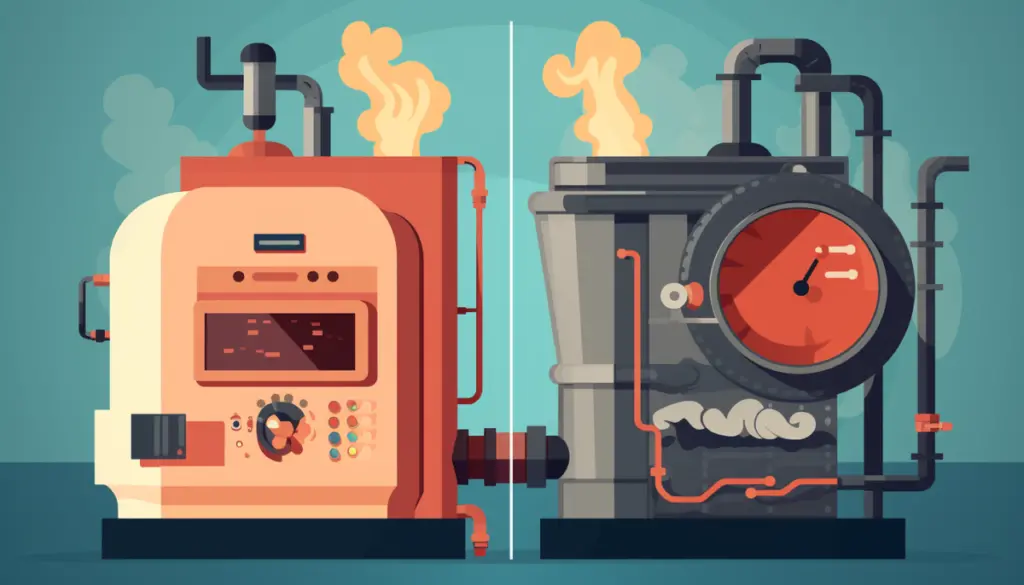Blog
What is the difference between a boiler and a furnace?

We understand the intricacies involved in choosing the right heating system for your home. Two of the most popular and reliable options for residential heating are boilers and furnaces. Each system has its unique characteristics, advantages, and considerations.
In this guide, we’ll give you a clear understanding of both boilers and furnaces, helping you make an informed decision that best suits your home’s heating needs. Whether you’re building a new home, upgrading your existing system, or simply curious about your heating options, understanding the fundamental differences between these two systems is crucial.
Basic Principles of Boilers and Furnaces
Boilers
A boiler is a heating system that operates by heating water. The heart of a boiler is a combustion chamber where fuel (typically natural gas, oil, or electricity) is burned to heat the water. This heated water is then circulated throughout the home in pipes, leading to radiators or underfloor heating systems. As the hot water or steam travels through these pipes, it releases heat into the rooms, warming them up. Boilers are known for providing consistent, radiant heat that creates a comfortable living environment without the dry air often associated with other heating methods.
Furnaces
On the other hand, a furnace heats air, which is then distributed throughout the home via a network of ducts and vents. Furnaces typically use natural gas, propane, oil, or electricity as fuel. The process begins with the furnace drawing in cold air from the house, which is then heated over a heat exchanger. The warm air is pushed back into the living spaces by a blower. Furnaces are particularly common in regions where the natural gas supply is readily available and are appreciated for their ability to quickly heat a space.
Key Differences
The primary difference between these two systems lies in their heating approach. Boilers use hot water or steam to provide radiant heat, while furnaces use warm air. This fundamental difference affects not only the distribution of heat within your home but also aspects like installation, maintenance, energy efficiency, and overall comfort.
Energy Efficiency and Environmental Impact
In heating systems, energy efficiency isn’t just a buzzword; it’s a crucial factor affecting both the environment and your wallet. When comparing boilers and furnaces, it’s essential to consider their Annual Fuel Utilization Efficiency (AFUE) ratings. This rating measures how efficiently a heating system converts fuel into heat over a typical year. Generally, modern boilers have AFUE ratings ranging from about 87% to 95%, while high-efficiency furnaces can reach ratings up to 98.5%. This means that a greater percentage of the fuel used is directly converted into usable heat, reducing waste. Still, it’s important to note that although some high-efficiency furnaces outperform boilers, boilers are generally more efficient.
From an environmental standpoint, higher efficiency translates to lower carbon dioxide emissions. Since furnaces and boilers burn fuel to generate heat, their efficiency directly impacts the amount of greenhouse gases released into the atmosphere. A more efficient system burns less fuel to produce the same amount of heat, thereby emitting less carbon dioxide. This is particularly important for homeowners concerned about their carbon footprint.
The impact of energy efficiency extends to utility bills as well. A higher efficiency rating generally means lower fuel consumption, which in turn leads to reduced heating costs. While high-efficiency systems may have a higher upfront cost, they can offer significant savings in the long run through reduced energy bills. It’s a balance between initial investment and future savings, and understanding this trade-off is key when selecting a heating system.
Installation and Maintenance
Boilers require a network of pipes to distribute steam or hot water, and this can be more complex and time-consuming to install, especially in homes without existing piping. Furnaces, on the other hand, require ductwork to circulate hot air. If a home already has ductwork in place (perhaps from a previous furnace or a central air conditioning system), installing a new furnace can be relatively straightforward.
Maintenance requirements also differ between the two systems. Boilers generally have fewer moving parts compared to furnaces, which can translate to less wear and tear and potentially lower maintenance needs. However, it’s crucial to check for leaks in the system and ensure that the water pressure is maintained. Furnaces require regular filter changes (every 30 to 90 days) to maintain air quality and system efficiency. Neglecting this can lead to reduced efficiency and increased strain on the furnace.
In terms of long-term maintenance costs and frequency, both systems should ideally receive annual professional check-ups to ensure they are operating safely and efficiently. This regular maintenance can help identify potential issues before they become major problems, extending the life of the system. While the cost of these check-ups can vary, investing in routine maintenance from service technicians like us can save you significant money in the long run by avoiding costly repairs and ensuring the system operates at peak efficiency.
Cost Analysis
When evaluating the cost of heating systems, both the initial installation and long-term operational costs are pivotal factors. Typically, the upfront cost for installing a boiler is higher than that of a furnace. This is due to the complexity of the system, especially if your home does not already have the necessary piping for a boiler. Furnaces, generally, are less expensive to install, particularly if the house already has compatible ductwork.
However, the long-term operational costs paint a different picture. Boilers, often being more energy-efficient, can lead to lower utility bills over time. This efficiency is particularly noticeable in colder climates where the heating system is in use for a significant part of the year. The type of fuel used (natural gas, oil, electricity) also plays a crucial role in ongoing costs. Natural gas is typically the most cost-effective option, whereas electricity can be more expensive, depending on regional prices.
Another factor influencing overall costs is home insulation. A well-insulated home retains heat more effectively, reducing the workload on the heating system, whether it’s a boiler or a furnace. This efficiency can lead to substantial savings in energy costs, making insulation quality an essential consideration in the total cost analysis of your heating system.
Pros and Cons
Boilers:
- Advantages:
-
-
- Provide even, radiant heat, which is often more comfortable than the forced air from a furnace.
- Typically, it is a quieter operation since they don’t rely on blowers.
- Better air quality as they don’t circulate dust and allergens through ducts.
- Higher energy efficiency leads to lower long-term costs.
-
- Disadvantages:
-
- Higher initial installation costs.
- In the event of a leak, potential for significant water damage.
- Requires space for the installation of pipes and radiators.
Furnaces:
- Advantages:
-
-
- Lower initial installation costs, especially in homes with existing ductwork.
- Faster heating of the space.
- It can be used in conjunction with central air conditioning systems.
- Wide variety of options and models available.
-
- Disadvantages:
-
- It can circulate dust and allergens, affecting indoor air quality.
- It may produce a less even heat distribution, leading to hot and cold spots.
- Typically noisier due to the blower operation.
- Slightly lower energy efficiency compared to boilers.
Choosing the Right System for Your Home
Selecting the ideal heating system for your home involves considering several key factors. The size of your home plays a crucial role; larger homes may benefit more from the even heating of a boiler, while smaller homes might find a furnace more efficient. Climate is another important aspect; in colder regions, the efficiency of a boiler can offer significant savings on heating bills.
Additionally, consider the existing infrastructure of your home – if you already have ductwork, a furnace might be more cost-effective, whereas homes with existing radiators might lean towards a boiler. Finally, consult with HVAC professionals who can provide personalized advice based on your home’s needs and layout. Their expertise can guide you in deciding to balance comfort, efficiency, and budget.
Boilers vs. Furnaces: Final Thoughts
When choosing between a boiler and a furnace, it’s essential to weigh factors like energy efficiency, environmental impact, installation and maintenance costs, and the specific needs of your home. Boilers offer efficient, even heating and better air quality but have higher initial costs.
Furnaces, meanwhile, are less expensive to install but might lead to higher long-term operational costs. Ultimately, the decision should be based on thoroughly evaluating your home’s requirements, climate considerations, and budget constraints. Consulting with HVAC professionals can provide valuable insights, ensuring that your choice enhances comfort and aligns with your long-term heating needs and goals.
Other Resources:
Learn more about homeowner’s insurance and AC units
Learn how to choose the right size HVAC unit
